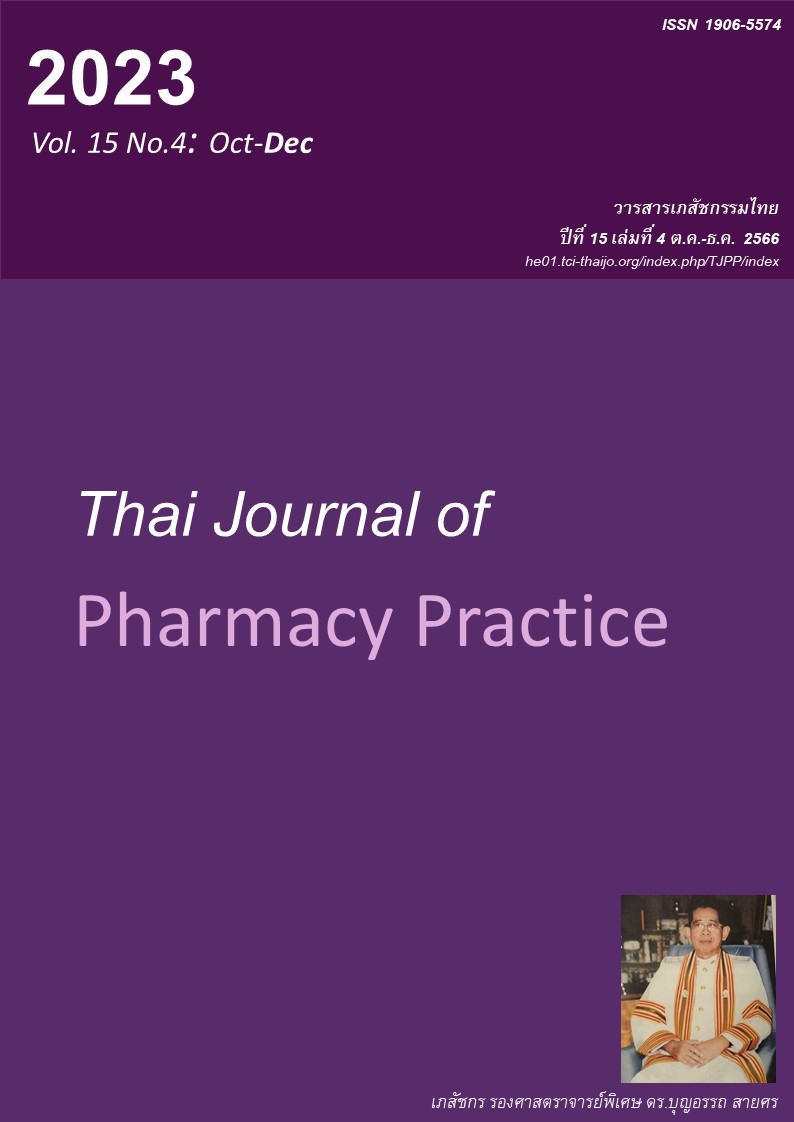คุณภาพของเว็บไซต์และเพจเฟสบุ๊กภาษาไทยที่มีเนื้อหาเกี่ยวกับสมุนไพรและผลิตภัณฑ์เสริมอาหาร
Main Article Content
บทคัดย่อ
วัตถุประสงค์: เพื่อประเมินความชุกของเว็บไซต์และเพจเฟสบุ๊กภาษาไทยที่มีเนื้อหาเกี่ยวกับสมุนไพรและผลิตภัณฑ์เสริมอาหารที่มีคุณภาพยอมรับได้ วิธีการ: งานวิจัยเชิงพรรณนาภาคตัดขวางครั้งนี้สืบค้นเว็บไซต์และเพจเฟสบุ๊กเกี่ยวกับสมุนไพรและผลิตภัณฑ์เสริมอาหารที่เป็นภาษาไทยอย่างเป็นระบบในระหว่างเดือนตุลาคมถึงธันวาคม พ.ศ.2562 โดยใช้โปรแกรมค้นหา ได้แก่ กูเกิล ยาฮู และบิง และจากระบบค้นหาของเฟสบุ๊ก คำค้นหาที่ใช้ คือ สมุนไพร สมุนไพรไทย สมุนไพรรักษาโรค อาหารเสริม และผลิตภัณฑ์เสริมอาหาร เครื่องมือที่ใช้ประเมินคุณภาพดัดแปลงจาก the Sandvik scale items เว็บไซต์และเพจเฟสบุ๊กฯ ถือว่ามีคุณภาพยอมรับได้ในงานวิจัยนี้หากมีคะแนนจากการประเมินอย่างน้อยร้อยละ 50 ของคะแนนทั้งหมด ผลการวิจัย: ความชุกของเว็บไซต์ (จากจำนวนทั้งหมด 274 เว็บไซต์) และเพจเฟสบุ๊ก (จากจำนวนทั้งหมด 385 เพจ) เกี่ยวกับสมุนไพรและผลิตภัณฑ์เสริมอาหารที่มีคุณภาพยอมรับได้ เท่ากับร้อยละ 34.7 และ 30.1 ตามลำดับ เว็บไซต์ (ร้อยละ 84.3) และเพจเฟสบุ๊ก (ร้อยละ 66.2) ส่วนใหญ่มีวัตถุประสงค์เพื่อการค้า ปัญหาหลักของแหล่งข้อมูลออนไลน์เหล่านี้ในประเทศไทย คือ ไม่มีการแสดงข้อมูลเกี่ยวกับ 1) ผลประโยชน์ทับซ้อน 2) แหล่งที่มาของข้อมูล และ 3) การให้ข้อมูลอย่างสมดุลทั้งประโยชน์และอาการไม่พึงประสงค์ เว็บไซต์มีคุณภาพดีกว่าเพจเฟสบุ๊ก เว็บไซต์และเพจเฟสบุ๊กที่มีคุณภาพยอมรับส่วนใหญ่ถูกจัดทำโดยหน่วยงานของรัฐ ได้แก่ สำนักงานคณะกรรมการอาหารและยา สถาบันการศึกษาระดับอุดมศึกษา สำนักงานกองทุนสนับสนุนการสร้างเสริมสุขภาพ และโรงพยาบาลรัฐ (ร้อยละ 12.4 และร้อยละ 7.3 สำหรับเว็บไซต์และเพจเฟสบุ๊ก ตามลำดับ) ซึ่งถือว่ามีจำนวนไม่มาก สรุป: ความชุกของเว็บไซต์และเพจเฟสบุ๊กภาษาไทยที่มีเนื้อหาเกี่ยวกับสมุนไพรและผลิตภัณฑ์เสริมอาหารที่มีคุณภาพยอมรับได้มีจำนวนมากกว่าเพจเฟสบุ๊ก ดังนั้นผู้บริโภคชาวไทยควรหาข้อมูลเกี่ยวกับสมุนไพรและผลิตภัณฑ์เสริมอาหารจากเว็บไซต์ของหน่วยงานภาครัฐ ซึ่งมีความน่าเชื่อถือ แหล่งข้อมูลออนไลน์เกี่ยวกับสมุนไพรและผลิตภัณฑ์เสริมอาหารในประเทศไทยจำเป็นต้องพัฒนาคุณภาพเพื่อคุ้มครองผู้บริโภคจากข้อมูลที่ไม่ถูกต้อง
Article Details

อนุญาตภายใต้เงื่อนไข Creative Commons Attribution-NonCommercial-NoDerivatives 4.0 International License.
ผลการวิจัยและความคิดเห็นที่ปรากฏในบทความถือเป็นความคิดเห็นและอยู่ในความรับผิดชอบของผู้นิพนธ์ มิใช่ความเห็นหรือความรับผิดชอบของกองบรรณาธิการ หรือคณะเภสัชศาสตร์ มหาวิทยาลัยสงขลานครินทร์ ทั้งนี้ไม่รวมความผิดพลาดอันเกิดจากการพิมพ์ บทความที่ได้รับการเผยแพร่โดยวารสารเภสัชกรรมไทยถือเป็นสิทธิ์ของวารสารฯ
เอกสารอ้างอิง
The National Broadcasting and Telecommunication Commission. Internet users in Thailand [online]. 2021 [cited Mar 29, 2021]. Available from: webstats. nbtc.go.th/netnbtc/INTERNETUSERS.php.
Statista. Number of Facebook users in Thailand from 2015 to 2025 (in millions) [online]. 2021 [cited Apr 28, 2021]. Available from: www.statista.com/statistic s/490467/number-of-thailand-facebook-users/.
Datareportal. Digital 2020: Thailand [online]. 2020 [cited Sep 28, 2022]. Available from: datareportal. com/reports/digital-2020-thailand.
Statista. Forecast of the number of Instagram users in Thailand from 2017 to 2025 [online]. 2020 [cited Sep 28, 2022]. Available from: www.statista.com /forecasts/1138778/instagram-users-in-thailand.
Statista. Forecast of the number of Youtube users in Thailand from 2017 to 2025 [online]. 2020 [cited Sep 28, 2022]. Available from: www.statista.com/forecas ts/1146362/youtube-users-in-thailand.
Kanjanahattakij N, Kwankhao P, Vathesatogkit P, Thongmung N, Gleebbua Y, Sritara P, et al. Herbal or traditional medicine consumption in a Thai worker population: pattern of use and therapeutic control in chronic diseases. BMC Complement Altern Med. 2019; 19: 258.
Holmes MM, Bishop FL, Calman L. "I just googled and read everything": Exploring breast cancer survi- vors' use of the internet to find information on com- plementary medicine. Complement Ther Med. 2017; 33: 78-84.
Kheokao J, Ubolwan K, Tipkanjanaraykha K, Plodp luang U. Online health information seeking beha- viors among the Thai elderly social media users. TLA Research Journal. 2019; 12: 60-76.
Electronic Transactions Development Agency (ETDA). Thailand internet user profile 2015. Bangkok: ETDA; 2013.
Sharma V, Holmes JH, Sarkar IN. Identifying complementary and alternative medicine usage information from internet resources. A systematic review. Methods Inf Med. 2016; 55: 322-32.
Owens C, Baergen R, Puckett D. Online sources of herbal product information. Am J Med. 2014; 127: 109-15.
Sawatlon W, Uacharoen K, Sinchai S, Phuengphol N, Tabtimtong T, Seedaya P, et al. The relationship between the use of online social networks and the decision making to use Thai herbal products of the students of Sirindhorn College of Public Health Chonburi [online] 2019. [cited Mar 29, 2021]. Available from: sc.sci.tsu.ac.th/tsucon29/Proceeding _TSUCon29_2562.pdf
Klein JJ, Schweikart SJ. Does regulating dietary supplements as food in a world of social media influencers promote public safety? AMA J Ethics. 2022; 24: E396-401.
Phanthu S, Sritong C. Factors affecting online repurchase intention of herbal supplementary products. Journal of Management Science Review. 2019; 1: 63-71.
Bernstam EV, Sagaram S, Walji M, Johnson CW, Meric-Bernstam F. Usability of quality measures for online health information: Can commonly used technical quality criteria be reliably assessed? Int J Med Inform. 2005; 74: 675-83.
Saisin W, Lerkiatbundit S. Effects of the use of criteria for credibility evaluation of websites with advertisings of health products by consumers: A case study of food supplements. Thai Journal of Pharmacy Practice 2021; 13: 228-41.
Tangkiatkumjai M, Boardman H, Praditpornsilpa K, Walker DM. Reasons why Thai patients with chronic kidney disease use or do not use herbal and dietary supplements. BMC Complement Altern Med. 2014; 14: 473.
Statista. Market share of leading search engines across Thailand in 2020 [online]. 2020 [cited Apr 28, 2021]. Available from: www.statista.com/statistics /954428/thailand-market-share-of-search-engines/.
Sandvik H. Health information and interaction on the internet: a survey of female urinary incontinence. BMJ. 1999; 319: 29-32.
Anti-Fake News Center Thailand. Herbal medicine [online].2020 [cited Apr 28, 2021]. Available from: www.antifakenewscenter.com/.


